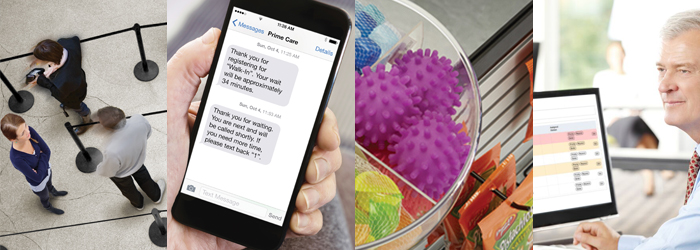
3 Ways to Improve Restaurant Customer Service with Virtual Queuing
More customers is a good thing for restaurants, but more customers often equates to longer wait times. And longer wait times equate to more opportunities for walk-outs, disappointed customers, and lost sales.

Restaurants are turning to technology to “turn tables” faster (in other words, get people fed and out the door) in order to reduce the time patrons spend waiting for a table to open up. Tablets (such as iPads) are being used to assist customers in paying their checks more efficiently and some restaurants are trying out the concept of allowing guests to order their meals via tablets placed at each table. The idea is, if customers don’t have to wait for a server to take their orders or handle their check, the service will go faster and the table can turn more quickly. But there’s another side to this story.

In addition to speeding up the service at each table—or perhaps in lieu of trying to rush people away from their nice relaxing meal—restaurants can focus on ways to reduce the real and perceived wait times at the other end of the spectrum.
By keeping those who are waiting happy, restaurants can stand to increase the perception of customer service and decrease the number of customers who walk away unfed or unhappy with the time they just spent waiting for a table. Virtual queuing applications, which can run on tablet and mobile devices, improve the customer service experience for waiting customers in 3 critical ways:
1. Allow customers to get out and about

Virtual queuing applications that integrate with text messaging allow customers to register for their place in line then receive text messages as they near the front of the virtual waiting line. This gives customers the opportunity to walk around, run errands, or even sit at the bar and relax.
2. Keep customers entertained while they wait
Many virtual queuing systems come equipped with digital screens that not only display queuing prompts to notify the next waiting customer, but also display video or promotional messaging to keep customers occupied.
3. Allow customers to reserve their spot in line
Virtual queuing systems can provide mobile access, allowing customers to reserve a spot in line while on their way to the restaurant. This can automatically reduce perceived wait times (since they’re busy driving, parking, and walking instead of sitting idle) and commits the in-route patron to bypass competing restaurants and head straight to their planned destination. Restaurants need to manage expectations from the time patrons enter the waiting line to the time they pay their bills. Virtual queuing offers one way to keep the first impression a more positive one and keep more customers from walking out the door.
SUBSCRIBE
Subscribe to stay up-to-date with new products, resources information and news.
RECENT RESOURCES
Düsseldorf Airport’s Automated Queuing System
ViewTheft at the Register: How Strategic Queue Design Protects Profits
ViewRapid Deployment Crowd Control: JetTrac Portable Barriers For The Biggest Spaces
View4 Psychological Reasons Your Customers Hate Waiting In Line
View








